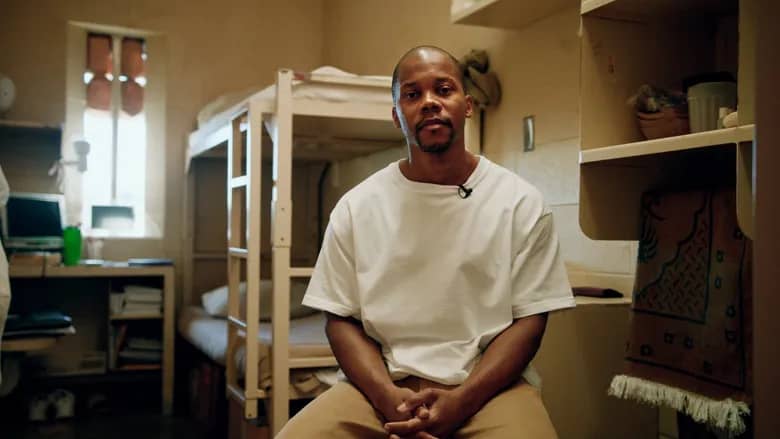By Damali and Nii B. Andrews.
The Accra premiere of the landmark film – SINCE I BEEN DOWN occurred at the National Theater in Accra this Thursday in the presence of the acclaimed film maker Gilda Sheppard PhD who wrote, directed and produced the film after a twelve year labor of love.
Sheppard’s profound 105 minute docudrama unfolds the story of the main protagonist, Kimonti Carter, who is serving life without parole in a Washington state prison. He was from the Hilltop neighborhood in Tacoma, Washington just outside Seattle which is the urban setting of the film.
Carter’s experience illustrates the dehumanization and trauma that accompany incarceration, but also demonstrates the possibility of redemption even among those society has called irredeemable.

“We never too old to find peace with ourselves”, intoned a member of the Black Prison Caucus – founded in 1972 as an inclusive group of those incarcerated who are devoted to struggling for their liberation through self help and knowledge; in short, “prisoners lifting up prisoners”.
“We can never become somebody different, but we can become a better version of who we are.” explained Kimonti Carter.
The film starts with the situation in the US during the 80s and early 90s, where a heightened sense of crime led the then POTUS, Bill Clinton in 1993 to introduce the three strike rule; ” three strikes and you are out”, he declared.
The face of the perceived threat disproportionately became black and brown young men with Washington State being the first to implement the rule.

Severe consequences followed for young people especially within red lined urban communities; specific laws were passed, policies drawn and aggressive and discriminatory language employed; the urban youth was seen as a “super predator”.
Within the context of today’s fast evolving media landscape, Sheppard manages to employ engaging cinematography techniques to telegraph the vast wide spaces of the Pacific Northwest while subtly juxtaposing them with the suffocating and claustrophobic environments of prison life.
The wasteland arising from the harvesting of timber even as we hurtle towards a climate catastrophe as evidenced by walls of wildfire in the recent past, should make us think of the young lives and dreams decimated by stereotyping, grossly unbalanced public services and opportunities even in the “greatest country” on earth.
Several other tropes and metaphors also come to play.

Sheppard utilizes both authentic African masks from the classic cannon and stylized pieces worn by actors during interludes woven into the narrative.
This pushes us to consider the real personalities and motivation of the characters on screen not withstanding their assigned roles and to look into our own souls.
Are the perpetrators also victims; and the victims also perpetrators; are the prison officers neutral or do they have a conflict of interest within the system; is it possible to declare yourself neutral, disinterested or unaffected by the totality of the circumstances and events at play?
These and many other questions come to the fore all within the toxic and bogus brew of race – an obnoxious and disgraceful facet of life in America, though the country still bravely struggles to transcend it with varying degrees of success and abject tragedy.

When asked about their thoughts on justice; the admission by the two Police Officers (who were the point men in effecting arrests within the Tacoma Hilltop neighborhood) that they had absolutely no concept of the word was enough to bring gasps of dismay from certain sections of the audience.
Need we remind ourselves then that justice is a concept that originated from Africa – perhaps that is why it still struggles to gain a foothold all over the world……and even today within Africa itself?
“Gangs are not the root cause. Drugs are not the root cause. These are public health issues,” says Sheppard in a prior interview while reflecting on the human cost and ultimate ineffectiveness of punitive policies. “Instead of going to the root cause, it was a pipeline to prison; a pipeline to punishment. I think of [Equal Justice Initiative founder] Bryan Stephenson, who says that the answer to poverty is not wealth; the answer to poverty is justice.”

But the disciplined posture of the incarcerated persons as evidenced by their always resolute and dignified filed entrance into their classroom shows us the indomitable nature of the human spirit.
They had to write their own syllabus and teach themselves since no professors would come and teach them with the explanation that the prisons were located in remote and desolate places.
The incarcerated persons came together as human beings in order to attempt to resolve problems that those on the outside with their “unfettered freedom” and resources had done very little to address.
The attitude of the “been down” people as exemplified by the gripping choreography of Marcus Cooper and the sublime moves of the praise dancers on the steps of the courthouse leaves us all with brimming hope.
It is not at all surprising that already Sheppard’s powerful, deeply moving and highly reflective film has been shown at over 20 film festivals and influenced immediate changes in legislation within Washington State.



Wonderful. I am deeply touched.
Very moving. It shows a deep thinker who has invested so much knowledge searching into her work so that she can illustrate the dehumanization and trauma that accompany incarceration!
Insightful.
Nice! 🙌🏾
Oh wow! How did I miss this?
A truly amazing and finely sculptured film. Sorry I missed you and Damali. So long!
“The answer to poverty is not wealth ; the answer to poverty is justice”